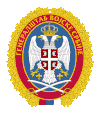Ljubiša Diković
Ljubiša Diković | |
|---|---|
NATO Bombing of Yugoslavia | |
| Awards | Order of Karađorđe's Star |
Ljubiša Diković (Serbian Cyrillic: Љубиша Диковић; born 22 May 1960) is the former Chief of General Staff of the Serbian Armed Forces from 12 December 2011 to 14 September 2018.[1] He previously served as Commander-in-Chief of the Serbian Land Forces.[2]
Military career
Diković was born in
From 1996 to 1998 Diković served as Chief of Staff of 37th motorized brigade, which is part of
Between 2006 and 2007 General Diković held position of Chief of Staff of Joint Operations Command of
On 14 September 2018, he retired from the military service and Milan Mojsilović replaced him as the Chief of General Staff of the Serbian Armed Forces.[4] He also became the recipient of the Order of Karađorđe's Star, Serbian highest civilian and military decoration.[4]
Alleged war crimes
After being appointed Chief of General Staff of Serbia in 2011, Belgrade-based NGO "Humanitarian Law Center" published two dossiers - "Ljubiša Diković" Dossier in 2012 and "Rudnica" Dossier in 2015. Both dossiers offer evidence that the unit that Diković commanded - 37th Motorized Brigade of the Yugoslav Army - committed war crimes against Albanian civilians in Kosovo during the Kosovo war. Both files offer excerpts of authentic military documents, including orders and combat reports signed by Ljubiša Diković.[5][6]
"Ljubiša Diković" Dossier from 2012 describes seven crimes committed against Albanian civilians in Kosovo, including murder, rape and deportation, in the area of responsibility of the 37th Motorised Brigade, which resulted in the death of over 450 civilians.
In 2013 a mass grave was discovered Rudnica - in a village in southern Serbia, from which in 2014 52 bodies of Albanian civilians from Kosovo were exhumed.[7] Based on the documentation,[8] in particular the testimony of eyewitnesses, the Humanitarian Law Center was able to identify the circumstances of their death; while on the basis of the use of military and police records from the ICTY database managed to identify the unit that had been present at the time and place of the crime. "Rudnica" Dossier of 2015 provides insight into the evidence on four crimes committed in April and May 1999 in Kosovo, in the area of responsibility of the 37th Motorized Brigade, whose victims were exhumed from mass graves in Rudnica. Military documents, including orders and combat reports of the 37th Motorized Brigade, indicating that members of the brigade participated in at least two of the four crimes.[9][10] Moreover, orders signed by General Diković for clearing up of the territory[11] show that the 37th Motorised Brigade was responsible for removing the bodies of Kosovo Albanians in their area of responsibility, which indicates that the members of this brigade, have since then took part in the cover-up of civilian bodies found in Rudnica.[12]
However, none of the claims in these dossiers were investigated by the national and international courts, nor were the members of 37th Motorised Brigade prosecuted for the alleged war crimes.[13]
References
- ^ "Ljubiša Diković: New Serbian Army Chief of Staff". glassrbije.org. Retrieved Nov 19, 2022.
- ^ Delegation of Serbian Army Land Forces visits US
- ^ [1] Archived 2013-04-20 at the Wayback Machine Official biography from SAF website
- ^ a b "General Milan Mojsilović novi načelnik Generalštaba". n1info.com (in Serbian). 14 September 2018. Retrieved 14 September 2018.
- ^ "MKSJ, Šainović i dr, dokazni predmet broj P2807, Borbeni izveštaj 37. mtbr VJ od 3. aprila 1999" (PDF). zonaneodgovornosti.net. Retrieved Nov 19, 2022.
- ^ "MKSJ, Šainović i dr, dokazni predmet broj P2813, Zapovest komandanta 37. mtbr VJ za uništenje ŠTS i borbenu kontrolu teritorije od 4. aprila 1999" (PDF). zonaneodgovornosti.net. Retrieved Nov 19, 2022.
- ^ Petrit, Collaku; Ristic, Marija (19 February 2015). "New Kosovo Mass Grave Searches Planned in Serbia". Balkan Insight. BIRN. Retrieved 1 March 2017.
- ^ "War Crimes and Past Human Rights Violations Data Base". Humanitarian Law Center. Humanitarian Law Center. Retrieved 1 March 2017.
- ^ "Rezallë". Zone of (non)responsibility. Humanitarian Law Center. Retrieved 1 March 2017.
- ^ "Çikatovё e Vjetёr". Zone of (non)responsibility. Humanitarian Law Center. Retrieved 1 March 2017.
- ^ "MKSJ, Šainović i dr, dokazni predmet broj 5D1028, Naređenje 37. mtbr VJ za asanaciju bojišta od 5. aprila 1999" (PDF). zonaneodgovornosti.net. Retrieved Nov 19, 2022.
- ^ "Letter to Vice President Joe Biden". Human Rights Watch. Human Rights Watch. Retrieved 1 March 2017.
- ^ Jevtić, Željka (18 November 2018). "OTKRIVAMO Prištinski funkcioneri spremaju SPISAK META ako uđu u Interpol, prvi na listi za hapšenje - Diković". blic.rs (in Serbian). Retrieved 18 November 2018.
External links
![]() Media related to Ljubiša Diković at Wikimedia Commons
Media related to Ljubiša Diković at Wikimedia Commons

